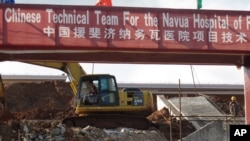The first comprehensive study of China's growing aid program in the South Pacific has found that Beijing provided financial assistance worth more than a billion dollars in the past decade. China is poised to overtake Japan as the region's third-biggest donor after Australia and the United States, according to the Sydney-based Lowy Institute for International Policy.
The Lowy Institute considers China’s aid to the South Pacific mostly to be a good deed by a responsible global citizen. The financial assistance is also seen as a way to ease friction.
Researchers say that an influx of Chinese companies and migrants has caused tensions with islander communities. Fishing, both legal and illegal, by Chinese boats is of particular concern, along with mining operations.
The largest Chinese investment project in the region is the $1.6 billion Ramu Nickel mine in Papua New Guinea. It is controversial because of concerns about its impact on the environment. But China, which is the second-largest trading partner of the Pacific islands, hopes that as a major donor a more positive image will be projected.
Philippa Brant, a Research Associate at the Lowy Institute, said Beijing will need to work hard to restore its reputation.
“China actually does have a bit of a challenge in the region in that along with a growing aid program there has been an increase in the number of Chinese companies investing, and with that the number of Chinese migrants moving to the region, and this has caused some resentment and some concern within Pacific island communities and that is actually becoming quite a challenge for the Chinese government to manage,” said Brant.
The Lowy Institute's assessment of Chinese aid has drawn on 500 sources, including budgets, tender documents and government statements, and is the first comprehensive survey of its kind.
Since 2006, China has provided $1.4 billion in bilateral foreign aid to the South Pacific. Australia remains the largest donor, providing almost $7 billion over the past decade.
China has diplomatic relations with eight South Pacific island nations; the Cook Islands, the Federated States of Micronesia, Fiji, Niue, Papua New Guinea, Samoa, Tonga, and Vanuatu.
A tussle with Taiwan saw ‘checkbook diplomacy’ come to the fore in the region, as Beijing and Taipei offered inducements in return for political recognition.
The spending contest largely came to an end in 2008, when Taiwanese authorities struck a deal with Beijing.







